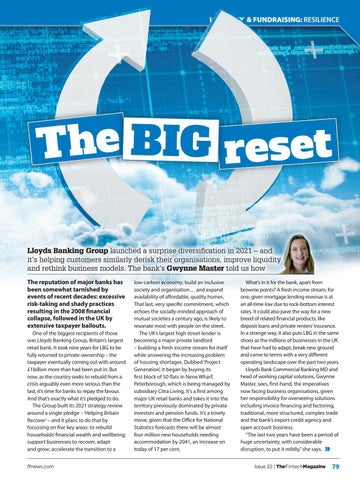LIQUIDITY & FUNDRAISING: RESILIENCE
The BIG reset Lloyds Banking Group launched a surprise diversification in 2021 – and it’s helping customers similarly derisk their organisations, improve liquidity and rethink business models. The bank’s Gwynne Master told us how The reputation of major banks has been somewhat tarnished by events of recent decades: excessive risk-taking and shady practices resulting in the 2008 financial collapse, followed in the UK by extensive taxpayer bailouts. One of the biggest recipients of those was Lloyds Banking Group, Britain’s largest retail bank. It took nine years for LBG to be fully returned to private ownership – the taxpayer eventually coming out with around £1billion more than had been put in. But now, as the country seeks to rebuild from a crisis arguably even more serious than the last, it’s time for banks to repay the favour. And that’s exactly what it’s pledged to do. The Group built its 2021 strategy review around a single pledge – ‘Helping Britain Recover’ – and it plans to do that by focussing on five key areas: to rebuild households’ financial wealth and wellbeing; support businesses to recover, adapt and grow; accelerate the transition to a ffnews.com
low-carbon economy; build an inclusive society and organisation… and expand availability of affordable, quality homes. That last, very specific commitment, which echoes the socially-minded approach of mutual societies a century ago, is likely to resonate most with people on the street. The UK’s largest high street lender is becoming a major private landlord – building a fresh income stream for itself while answering the increasing problem of housing shortages. Dubbed ‘Project Generation’, it began by buying its first block of 50 flats in Nene Wharf, Peterborough, which is being managed by subsidiary Citra Living. It’s a first among major UK retail banks and takes it into the territory previously dominated by private investors and pension funds. It’s a timely move, given that the Office for National Statistics forecasts there will be almost four million new households needing accommodation by 2041, an increase on today of 17 per cent.
What’s in it for the bank, apart from brownie points? A fresh income stream, for one, given mortgage lending revenue is at an all-time low due to rock-bottom interest rates. It could also pave the way for a new breed of related financial products, like deposit loans and private renters’ insurance. In a strange way, it also puts LBG in the same shoes as the millions of businesses in the UK that have had to adapt, break new ground and come to terms with a very different operating landscape over the past two years. Lloyds Bank Commercial Banking MD and head of working capital solutions, Gwynne Master, sees, first-hand, the imperatives now facing business organisations, given her responsibility for overseeing solutions including invoice financing and factoring, traditional, more structured, complex trade and the bank’s export credit agency and open account business. “The last two years have been a period of huge uncertainty, with considerable disruption, to put it mildly,” she says. Issue 22 | TheFintechMagazine
79
